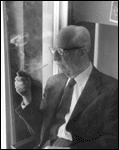A Biography of Joseph Sittler http://www.josephsittler.org/biography/ - The favicon in the browser is his picture! | | | | |
| | The human is created for transcendence.... This phrase from Gravity and Grace exemplifies the man who wrote it, Joseph A. Sittler. He was born in Upper Sandusky, Ohio, on September 26, 1904, the son of a Lutheran pastor (also named Joseph) and a remarkable woman, Minnie Vieth Sittler. He was a graduate of Wittenberg College and the Hamma Divinity School and began his career in the ordained ministry as pastor of Messiah Lutheran Church in Cleveland, Ohio. For most of his life, however, he was a Professor of Theology, first at the Chicago Lutheran Seminary in  Maywood, Illinois, then at the Divinity School of the University of Chicago. He ended his nearly 58-year career as theologian with fifteen years of association with the Lutheran School of Theology at Chicago (LSTC); that association included the title of Distinguished Professor in Residence. Maywood, Illinois, then at the Divinity School of the University of Chicago. He ended his nearly 58-year career as theologian with fifteen years of association with the Lutheran School of Theology at Chicago (LSTC); that association included the title of Distinguished Professor in Residence.The biographical statement in the bulletin for the Service of Thanksgiving for his life, at LSTC in January of 1988, well summarizes his varied and rich contributions to theology: “Significant areas of his impact can only be enumerated: a leading member of the Commission on Faith and Order, the highest theological council of the World Council of Churches (WCC), in which capacity he gave the keynote address (‘Called to Unity’) to the Third Assembly of the WCC in 1961 in New Delhi; an important contributor to the theological self-understanding of the Lutheran Church in America, especially its Confession of Faith (The Doctrine of the Word in the Structure of Lutheran Theology, 1948); a commentator upon literature, architecture, classical and jazz music, science, and ecology; a theologian concerned with ecology long before it became a popular  theme (The Care of the Earth, 1964, Essays on Nature and Grace, 1972); a profoundly feminist thinker; he gave theological foundation to the situational approach to Ethics (The Structure of Christian Ethics, 1958). In the late 1950's, he was featured in a Life magazine article as one of America’s “Ten Most Influential Theologians.” theme (The Care of the Earth, 1964, Essays on Nature and Grace, 1972); a profoundly feminist thinker; he gave theological foundation to the situational approach to Ethics (The Structure of Christian Ethics, 1958). In the late 1950's, he was featured in a Life magazine article as one of America’s “Ten Most Influential Theologians.”He was a preacher to the intellectual community without peer. In his prime, he was said to have been the single most sought after university and college preacher in America. He gave both the Beecher Lectures at Yale (The Ecology of Faith, 1961), and the Noble Lectures at Harvard, both devoted to preaching. Many of his preaching themes are included in his later books, Grace Notes and Other Fragments (1981), and Gravity and Grace (1986).” But such a statement cannot begin to capture the transcendent humanity of Joseph Sittler. He delighted in Polish sausage and beer (and conversation!) at Jimmy’s, an “establishment” close to the University of Chicago and LSTC. He saw theological significance in the most ordinary activities of common folk in everyday life. He relished encounters with all sorts of people and never conveyed any hint of condescension. He had a marvelous sense of humor and could be astonishingly frank without ever offending. As his eyesight failed in later life, he drew on an amazing store of memorized poetry and literature, and he continued to carry on a vast correspondence with all sorts and conditions of people – he was never too busy to neglect noting some important event in the life of a friend or colleague. [GJ - The previous sentence is nonsense, never too busy to neglect! - The problem with faux-profundity.] He and his wife Jeanne, herself a fine musician and composer, raised six children. Sittler died on December 28, 1987, but the legacy he left, not only in spoken and written words but in the lives of those he touched is well illustrated in the introduction to Running with the Hounds, written by Donald Hetzler. *** GJ - I remember LCA pastors cooing like schoolgirls over Sittler. "Did you have him or ever hear him?" He was the Sweet of his day, loaded up with worldly honors and talking gibberish like the gurus of today. Bruce Church referenced him in his comment about UOJ - bruce-church (https://bruce-church.myopenid.com/) has left a new comment on your post "How Does UOJ Differ from ELCA's Position?": The article implies that ELCA universalism comes from Joseph Sittler, Jr., a "contemporary" theologian who flourished in the 1950s. Walther was a contemporary theologian in his time, too. Best to stick to dead theologians, as Dr. Jackson sometimes says: http://www.josephsittler.org/biography/ |
